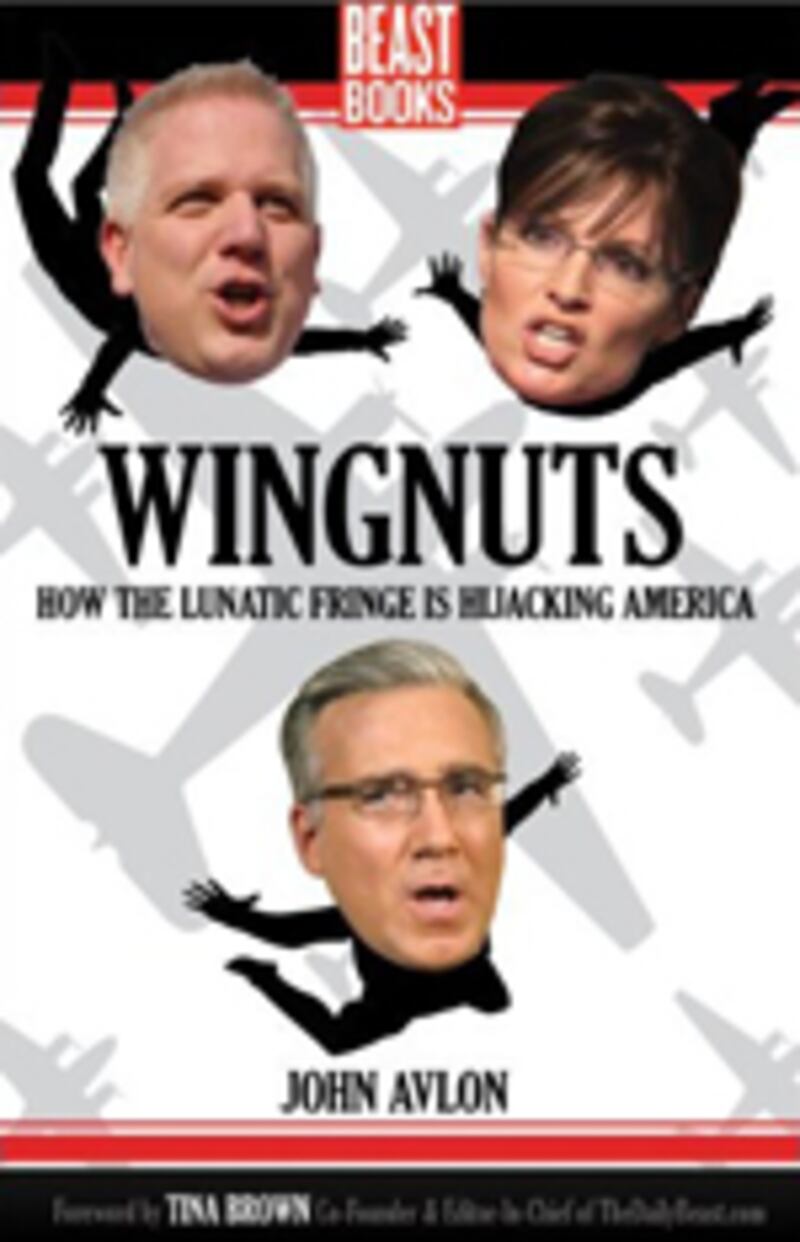
Twelve months into our online operations at The Daily Beast, we felt it was time to take advantage of digital technology and provide a new outlet for writers who have something relevant to say.
Wingnuts is the first book bearing the imprint of Beast Books. Twelve months into our online operations at The Daily Beast, we felt it was time to take advantage of digital technology and provide a new outlet for writers who have something relevant to say that cannot wait for the snail’s pace of traditional publishing schedules.
Beast Books will be longer than conventional long-form magazine articles but shorter than conventional nonfiction books. They will be published digitally and distributed on multiple platforms, and will soon thereafter be available as handy paperbacks. They’ll provide megabyte edification—and high-voltage provocation—with the ambition of enlarging our understanding of the complexities we chronicle every day at the fast and furious pace of breaking news on The Daily Beast.
To discount the Wingnuts as entirely delusional is too easy. And it’s a mistake: When we are so repelled by the language that we deny a genuine point, we merely aggravate the paranoia that agitates many of the Wingnuts.
Our political commentator John Avlon was a clear choice to kick off Beast Books. His assiduous reporting and his smart, passionate commentary have impressed colleagues and readers alike. All along, he has been keeping detailed track of America’s descent into bitter partisanship despite the advent of a president who fervently hoped for a politics that would be the very opposite.
It was Avlon who broke the story of the 38-year-old Young Republican leader Audra Shay, who had laughed at a supporter’s racist comments on Facebook. Shay littered her own Web site with charges that the president was “anti-American,” one of the new buzzwords of what Avlon, in this book, labels the “frightwing” of the political spectrum.
“Finding her offensive reaction online was a window into the way the Internet can help trace the rise of extremism in politics,” Avlon tells me. “It was almost surreal, almost funny, the way Shay was caught red-handed. Yet despite that, the Young Republicans elected her as their president! It made me realize how deep the rot had gotten.” The explosion of traffic on his Shay story suggested that the incident had galvanized opinion left and right.

Avlon knows politics inside and out. Now 37, he was the youngest but longest-serving speechwriter in the administration of former Mayor Rudy Giuliani. After the 9/11 attacks, he wrote the official eulogies for the many New York City firefighters, New York City police officers, Port Authority officers and other emergency workers who died that day. Though he crafted all those speeches for a Republican mayor—and was deputy policy director for Giuliani’s 2008 campaign—he has a passion for what Arthur Schlesinger, Jr., called “the vital center.” In a year writing for the Beast, he has punched left and (especially) right at the extremes of angry, partisan incivility that have hijacked American politics and thwarted progress.
Avlon adopted the term Wingnuts to describe the growing number of wreckers of our national debate. Discourse? That’s too civilized a term for what we hear when we watch cable TV or log on to any one of the innumerable, foaming partisan Web sites—a hectoring cacophony of mistrust and ill will, usually uninformed, always vehement.
Who are the Wingnuts and what do they represent for American politics? One of Avlon’s purposes in writing his book is to identify the leaders. Another is to describe the origins of randomly formed convictions that strike most of us as crazy but often have a core of justified grievance, a legitimate if lurid fear of where the country they love is headed.
To discount the Wingnuts as entirely delusional is too easy. And it’s a mistake: When we are so repelled by the language that we deny a genuine point, we merely aggravate the paranoia that agitates many of the Wingnuts. Many of the miseries that have beset Americans in the last two years have been too complex to easily explain. The near collapse of our economic system, caused by so few but afflicting so many, and the confusion and distortion surrounding the raucous, bitter health-care debate have been exploited by talk-show hosts and partisan politics to fan a rabid ignorance that looks for simpler things to blame.
On the weekend of Avlon’s pre-wedding bachelor party in Las Vegas in October, he took some time out to attend a meeting at the Texas Station Hotel and Casino of the Oath Keepers, a group of gun-toting law-enforcement officers, military men, and hangers-on who had gathered in the desert to reaffirm their oath to defend the Constitution against all enemies—a category some of them apparently believe include President Barack Obama. Avlon assured me, “These people are not stupid.
"They actually think they are fighting for freedom. They have wrapped up their extremism in George Washington. In a sense that’s the hopeful part. The bad part is that people like this are being used in the larger hyper-partisan devilment. As long as they’re willing to rile the opposition, some political leaders think that’s just fine. But they’re creating conditions that can get out of control. There’s no understanding that the entire country has an investment in Barack Obama’s future.”
Reading Avlon’s analysis, I was reminded of my time living in Britain when the extremes of nationalism and religion took Northern Ireland into 30 years of violence from which it is only now recovering. And, of course, it was the Irish poet William Butler Yeats who so memorably captured the eternal predicament of oppositional politics: The best lack all conviction, while the worst are full of passionate intensity.
Yeats’ words convey the menace that can explode into bloodshed and violence when that intensity gathers unchecked force. And Avlon does see something menacing in today’s Wingnut phenomenon.
Yes, we’ve had rabid radio shouters and dangerous demagogues before. We had Father Coughlin and the Kingfish, Huey Long, railing against Franklin Roosevelt. We had Joe McCarthy’s incitements in the time of Dwight D. Eisenhower, who would become a great president but yet, in the clamor of the 1952 campaign, on one sad day felt unable to defend the honor of one of his benefactors, General George Marshall, an American patriot and a brilliant secretary of State, whom McCarthy had foully denounced as “steeped in falsehood.”
What is new is the multiplying reach and volume of the Internet, concentrating the toxicity of destructive emotions and circulating them in the political bloodstream with unparalleled velocity. That, and the fact that our contemporary Father Coughlins are now in control of the megaphone of 24/7 cable and radio talk shows. In a conversation with Avlon about his manuscript, he pointed out that political extremism is not the way America was built. “Most of the great Americans who have led our country to better times in peace and in war have not been polarizers, pitting left against right. They have been centrists who had moved the country forward, not sideways or backward—in the White House, Theodore Roosevelt, Harry Truman, Dwight Eisenhower, John Kennedy, but also in the Senate, with centrist figures like Daniel Patrick Moynihan of New York and Margaret Chase Smith of Maine, the first popularly elected female senator, a Republican who stood up against Joe McCarthy.”
Avlon is an independent who describes himself as “fiscally conservative but socially progressive.” But he believes that the old labels don’t fit anymore, that they fail to illuminate our unprecedented polarization—not just in politics but in the media, too. “We are self-segregating in our news habits going to either Fox or MSNBC, with CNN, which I admire, sticking to a middle course that is too neutral for our times. I’ve written Wingnuts, against both left and right extremes, because I believe we should see the extremes for what they are and attack them—the Wingnuts of the left as much as the Wingnuts of the right. Nobody can even agree on a common reality anymore, and it leaves the rest of the American public totally confused. My conviction from observing the disintegration of our politics for some years now is that an attempt at a bland bipartisanship is just not enough.”
CBS’s Ed Murrow may have been overcelebrated as the principled observer for the masses, fair yet unafraid to take on the bullies. But Avlon’s beef is that no one even aspires to be Ed Murrow anymore. “The media we have today is a crucial element in the polarization. It’s not at all interested in discerning the good and bad points of a policy so much as drumming up dissent and feeding an extremist audience with the raw meat it needs to sustain its paranoia. Because audiences have been built that way, because that’s where the profits lie, they have a vested interest in creating niche audiences of the like-minded. It may be entertaining, but it is certainly not enlightening.”
Fortunately, John Avlon’s Wingnuts is both.
Plus: Check out Book Beast for more news on hot titles and authors and excerpts from the latest books.
Tina Brown is the founder and editor in chief of The Daily Beast. She is the author of the 2007 New York Times bestseller The Diana Chronicles. Brown is the former editor of Tatler, Vanity Fair, The New Yorker, and Talk magazines and host of CNBC's Topic A with Tina Brown .






